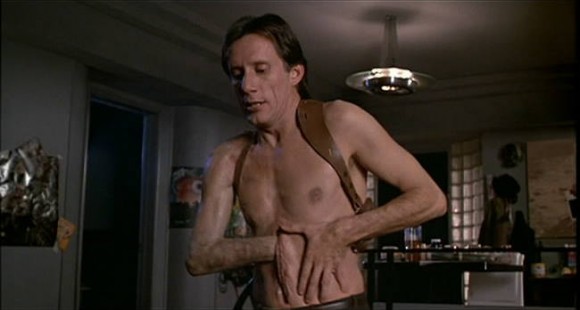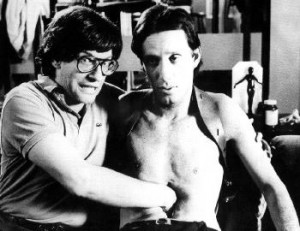FILM: Before social media made us, there was Videodrome
 Recognize this line? “Long live the new flesh!”
Recognize this line? “Long live the new flesh!”
Take a trip back in time to 1983 with the Bizarro Metro series this Friday at the Garneau Theatre with the David Cronenberg classic Videodrome.
It was the year when electric typewriters were still more prevalent than computers and the home video phenomenon was at its height. MTV was running hot in the U.S. before Canada’s MuchMusic had started, people were taping programs off their televisions, video rental stores were everywhere, and David Cronenberg was just beginning to be critically studied by critics outside the horror genre. One of the first books on Cronenberg, “The Shape of Rage: The Films Of David Cronenberg,” edited by Canadian film academic Piers Handling, had just come out that fall and the last two films mentioned in it were Videodrome and The Dead Zone, which still hadn’t been released in theatres.
For Cronenberg, it was the beginning of a series of films, including Dead Ringers (1988) and Naked Lunch (1991), which transformed his reputation from independent horror director to the serious avant-garde social critic and cinematic master he’s considered to be today. They blend his uneasiness with the body with oriental soft-core pornography, sadomasochism with paranoia and satellite TV, and Freud with media philosophy and the theories of Marshall McLuhan.
Videodrome is a visceral, hallucinatory trip that takes the viewer’s psyche to some uncomfortable places and stamps it with some iconic images which, once seen, can’t be forgotten. It can be disturbing, even by today’s standards, and its arguments about the television’s mental and physical effects on society are being echoed in much of the current controversy about the internet, the virtual world, and applications like Facebook.
Apart from being landmark Cronenberg, the film has several other things to recommend it, including a fine twitchy performance from James Woods. It’s also the feature debut of Deborah Harry, the alluring singer from the new wave music group Blondie, at the start of her acting career. As a bonus, it features the distinctive physical effects of seven-time Academy-award winning makeup artist Rick Baker (An American Werewolf In London) and a score by three-time Academy Award winning composer Howard Shore (The Lord Of The Rings).
Check out an avant-garde classic that isn’t often shown on the big screen.














